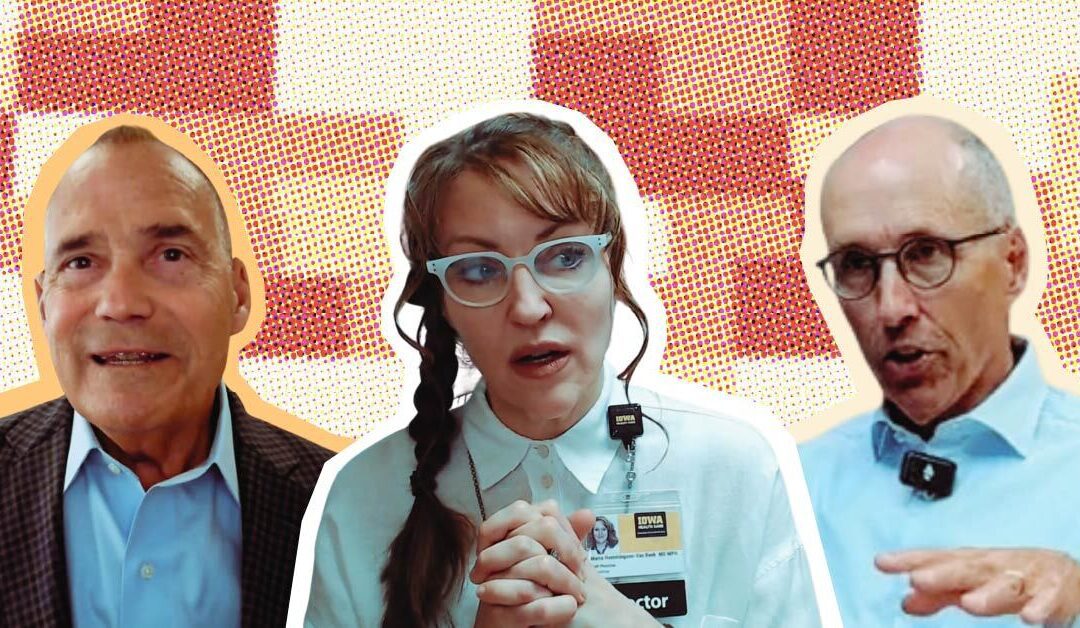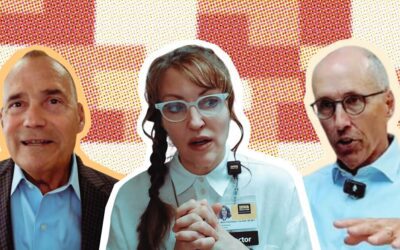
(Iowa Starting Line graphic)
Iowa cancer patients are desperate for better screenings, treatments, and cures. Researchers are desperate to find them. So what’s the holdup?
Brittney Stepanek and Jenni Winterhof, both of Cedar Rapids, share a bond forged by tragedy. Both lost their husbands—Stephen and Chad, respectively—in 2023 to glioblastoma, a type of brain cancer with only a 5.7% chance of five-year survival
“Really there’s nothing out there that will—for brain cancer—effectively treat it,” Winterhof said.
“I think the average patient who goes on standard of care may get up to a year or two,” added Stepanek.
With so few options for brain cancer treatment, both couples were willing to try anything—including designing and testing their own cancer-fighting device.
Chad Winterhof, an engineer, helped create “The Golden Halo,” a device that uses an energy field around his head to treat the tumors while sleeping. Jenni Winterhof credits it with his 2-and-a-half-year survival after diagnosis. (He had to convince his doctor to approve its usage. Stephen wasn’t able to use the device in time.)
“And [Chad] virtually went from a tumor about two-and-a-half by two centimeters, to not being visible on the MRI—in two or three months’ time,” Winterhof said.
Stories like Chad’s show what’s possible when new ideas get a chance to move forward. But across Iowa and beyond, patients and scientists are watching potential cancer breakthroughs stall while federal research funding is slashed or frozen.
The National Institutes of Health (NIH) has cut or paused more than $33 million for research at the University of Iowa. Meanwhile, new projects face long odds: Only 4% of new proposals to the National Cancer Institute will be funded going forward—translating to 4,000 fewer research projects this year, and 15,000 fewer next year.
After their husbands died—Stephen in May of 2023, and Chad in October of 2023—Stepanek and Winterhof knew they wanted to keep pushing for more patients to be able to access The Golden Halo. They began raising funds to go toward clinical trials at the University of Iowa; one of Stepanek’s fundraisers is this month.
“We’ve got about $40,000 in the bank, and then we’ve got about another $140,000 or so at the university that we’re begging them to use on this; there’s been a lot of roadblocks at the university and we’re working on that,” Winterhof said. “But we just want to be part of the solution.”
That solution, both stressed, would only be found in more research.
“We want to build prototypes,” Winterhof added, noting Chad had been working on a better, smaller version of The Golden Halo just before he died. “We want to get people in Iowa enrolled in this, because we believe in it and we want it to work for them, and we want to help save some people.”
Cuts to research harm patients
Just before she started medical school, Claire Brown of Iowa City discovered in June 2024 she had adenoid cystic carcinoma, a rare type of cancer found in the head and neck.
A budding pediatric cancer researcher, she went in for her radiation treatments—”in a very scary, hockey-style mask-looking thing,” she shared—and immediately connected the dots between cancer research and treatment.
“Someone figured out how to build a radiation machine,” Brown recalled thinking as the machine did its job. “Someone figured out how to calculate the appropriate dosage that isn’t going to kill me or hurt me, but is instead going to hit just the right level where it gets rid of my cancer, but protects me.”
That experience, along with accompanying doctors when they visit with sick kids, has solidified Brown’s desire to work in the field of cancer research.
“I’ve always felt very strongly about medicine and its importance and the power it has to change people’s lives,” she said. “But now, having been through this entire process myself, it’s easy for me to see how every step of my diagnosis, every step of my treatment, all of the reasons that I’m here today, they’re the result of cancer research. They’re the result of funding that was given to scientists and to doctors to do this really important work.”
But that funding is now in jeopardy. As Carole LaBonne, a biologist at Northwestern University, told The Guardian about changes at the NIH: “This will effectively shut down cancer research in this country and destroy the careers of many scientists. This is devastating.”
It’s not just funding—federal research priorities have shifted sharply under Trump. In February of this year, the NIH abruptly canceled any research projects that the agency thought involved diversity, equity, inclusion, gender identity, COVID-19, and vaccine hesitancy.
“I have never seen a record where racial discrimination was so palpable,” said District Judge William G. Young, who ruled the NIH’s actions were unlawful.
Yet that ruling only restores previously granted funds. New research proposals could still face ideological bans.
And just this month, the Department of Health and Human Services, led by vaccine skeptic Robert F. Kennedy Jr., canceled 22 federal contracts for mRNA-based vaccines. That technology has been at the forefront of new cancer treatments, and cancer researchers worry the government will come for them next.
These delays and disruptions in research have deadly consequences for cancer patients. Brown sees that firsthand.
“I’ve been in those rooms and I’ve seen the kids who, (under) the current standard of care, the current frontline therapies that we have, it’s failing them,” Brown said. “So continuing to do research is urgent.”
New cancer screenings are close
While research funding cuts threaten progress, there are some promising innovations in cancer detection nearing reality.
When Heidi Onda was diagnosed with lung cancer, she was perplexed as to why—until her adult son asked about their Colorado home’s radon levels, which, like Iowa, are typically high.
Physicians typically order lung cancer screenings for tobacco users, thus overlooking others who may be at risk.
This gap inspired Onda and her husband Pierre, a physician, to start The White Ribbon Project, which raises awareness of all types of lung cancer.
Now the Ondas are closely following the emerging research that could change screenings forever. Heidi listed several that sound promising: a blood test, a urine test, a nasal swab—all being worked on at different research universities and labs in the US and around the world.
“I think, within our lifetime, perhaps in 10 years, part of your health checkup will be cancer panels that do the blood tests, which then will determine whether or not you need other testing,” Pierre said.
“It’s just not there yet,” Heidi said.
Whether such advances reach patients—and whether the US will continue to lead the way in cancer research—remains uncertain.
Brown echoes this concern: She said she’s seeing “whole labs that are being shut down,” projects canceled, and researchers unable to be hired due to the freeze in federal grants.
“That means that whatever drug was being tested there will probably never make it to the clinic,” she said. “And that drug could be an absolute miracle drug.”
If we want research funded again, Brown says we need to make our voices heard.
“I think that the best thing that we as the general public can do is to tell our elected representatives that this is really, really important,” she said.
“It’s an emergency for patients,” she added. “That’s what really drives it for me, and what really crystallizes how important it is to keep doing this and to keep doing it now.”
Support Our Cause
Thank you for taking the time to read our work. Before you go, we hope you'll consider supporting our values-driven journalism, which has always strived to make clear what's really at stake for Iowans and our future.
Since day one, our goal here at Iowa Starting Line has always been to empower people across the state with fact-based news and information. We believe that when people are armed with knowledge about what's happening in their local, state, and federal governments—including who is working on their behalf and who is actively trying to block efforts aimed at improving the daily lives of Iowan families—they will be inspired to become civically engaged.


Surviving cancer in Iowa: Caregivers, advocates share their stories
Cancer in Iowa isn’t just about the research studies and the statistics. Real Iowans and their families are behind each diagnosis. Read our first...

We sent Iowans nitrate tests to check their water. Here’s what they found
This story first appeared in the Sept. 30 edition of the Iowa Starting Line newsletter. Subscribe to our newsletter to get an exclusive first look...

How can policymakers help reduce Iowa’s cancer rates?
This story first appeared in the Sept. 23 edition of the Iowa Starting Line newsletter. Subscribe to our newsletter to get an exclusive first look...

Fighting a health insurance denial? Here are 7 tips to help
By: Lauren Sausser When Sally Nix found out that her health insurance company wouldn’t pay for an expensive, doctor-recommended treatment to ease...

Iowa leads the nation in binge drinking—and faces higher cancer risks from alcohol
This story first appeared in the Sept. 16 edition of the Iowa Starting Line newsletter. Subscribe to our newsletter to get an exclusive first look...

What you can do to reduce your cancer risk: The big six for Iowans
A version of this story first appeared in the Sept. 9 edition of the Iowa Starting Line newsletter. Subscribe to our newsletter to get an exclusive...






